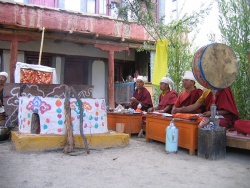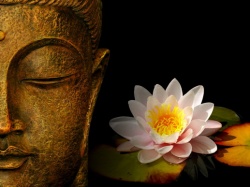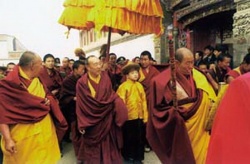Difference between revisions of "Happy to Return Home"
| Line 2: | Line 2: | ||
<poem> | <poem> | ||
ZHANG QINGYOU | ZHANG QINGYOU | ||
| + | [[File:B h2o-lily.jpg|thumb|250px|]] | ||
| + | It was a sunny day in early spring, when an old man in his early 80s met this reporter in the [[Labrang Monastery]]. Examining me through his black rimmed spectacles, he was both talkative and humorous. | ||
| − | + | Gao Wu, who returned from {{Wiki|Taiwan}} to settle down, recalled: “I was born into a herder’s family in Xiahe County, Gannan. Before [[liberation]], I labored for the Living [[Buddha]] Lancang of the [[Labrang]] [[Monastery]]. | |
| − | + | “After [[liberation]], I was allotted land and [[animals]]. But, in 1959, when I went on a [[pilgrimage]] to {{Wiki|Lhasa}}, I was taken away by the rebels to [[India]]. | |
| − | + | “I settled down in [[Darjeeling]]. My son, Gyailo, and Gyibusechi [[Lama]] with the [[Labrang Monastery]] later joined me there. We lived in [[India]] for 12 years. | |
| − | + | “In 1971, Gyailo and Gyibusechi came across {{Wiki|General}} Ma Jishou, elder son of Ma Bufang, who used to reside in Linxia, {{Wiki|Gansu Province}}. | |
| − | + | “They had a good chat. Later, Ma took them to {{Wiki|Taiwan}} and arranged for them to work in a factory on Jinmen Islet. | |
| − | + | “My son took me to Taibei and I received allowances from the KMT Commission for {{Wiki|Mongolian}} and [[Tibetan]] Affairs on a monthly basis. | |
| − | + | “My son bought a house in {{Wiki|Taiwan}} and we led a comfortable [[life]]. However, we missed our relatives, [[monasteries]], butter, zanba (roasted highland barley), the dew on the grass, and even the {{Wiki|smell}} of {{Wiki|cow}} droppings very much. | |
| − | |||
| − | “My son bought a house in Taiwan and we led a comfortable life. However, we missed our relatives, monasteries, butter, zanba (roasted highland barley), the dew on the grass, and even the smell of cow droppings very much. | ||
[[File:Story 803b.jpg|thumb|250px|]][[File:|thumb|250px|]] | [[File:Story 803b.jpg|thumb|250px|]][[File:|thumb|250px|]] | ||
| − | “When China introduced the reform and opening policy, the Labrang Monastery was reopened and became home to about 300 lamas. I was glad to hear of this, and the idea of going back home began to form in my mind. | + | “When [[China]] introduced the reform and opening policy, the [[Labrang Monastery]] was reopened and became home to about 300 [[lamas]]. I was glad to hear of this, and the [[idea]] of going back home began to [[form]] in my [[mind]]. |
| − | “In 1985, my son took me to India to attend a sutra recitation ceremony. When we were in Nepal, my other two sons came to visit us. It was a very emotional time. | + | “In 1985, my son took me to [[India]] to attend a [[sutra]] recitation {{Wiki|ceremony}}. When we were in [[Nepal]], my other two sons came to visit us. It was a very [[emotional]] [[time]]. |
“My two sons told us of the changes that had taken place in our hometown, and I decided to go back home with them. | “My two sons told us of the changes that had taken place in our hometown, and I decided to go back home with them. | ||
| − | “I returned in 1987 after a separation of 30 years. In 1995, my elder son also returned from Taiwan. | + | “I returned in 1987 after a separation of 30 years. In 1995, my elder son also returned from {{Wiki|Taiwan}}. |
| − | “The local government showed me loving care. I was given 4,000 yuan for settlement. Local leaders came to visit me. The CPPCC Xiahe Committee elected me as a member, giving me a chance to handle local government affairs. I enjoy a monthly allowance. | + | “The local government showed me [[loving]] care. I was given 4,000 yuan for settlement. Local leaders came to visit me. The CPPCC Xiahe Committee elected me as a member, giving me a chance to handle local government affairs. I enjoy a monthly allowance. |
| − | “I have bought a new house. In the morning, I join my children to take a ritual walk around the monastery and chant sutras. It is really a peaceful life after drifting here and there outside for decades.” | + | “I have bought a new house. In the morning, I join my children to take a [[ritual]] walk around the [[monastery]] and [[chant]] [[sutras]]. It is really a [[peaceful]] [[life]] after drifting here and there outside for decades.” |
</poem> | </poem> | ||
[http://zt.tibet.cn/tibetzt/tibet50-en/talk/talk_003.htm zt.tibet.cn] | [http://zt.tibet.cn/tibetzt/tibet50-en/talk/talk_003.htm zt.tibet.cn] | ||
Revision as of 01:46, 29 September 2013
ZHANG QINGYOU
It was a sunny day in early spring, when an old man in his early 80s met this reporter in the Labrang Monastery. Examining me through his black rimmed spectacles, he was both talkative and humorous.
Gao Wu, who returned from Taiwan to settle down, recalled: “I was born into a herder’s family in Xiahe County, Gannan. Before liberation, I labored for the Living Buddha Lancang of the Labrang Monastery.
“After liberation, I was allotted land and animals. But, in 1959, when I went on a pilgrimage to Lhasa, I was taken away by the rebels to India.
“I settled down in Darjeeling. My son, Gyailo, and Gyibusechi Lama with the Labrang Monastery later joined me there. We lived in India for 12 years.
“In 1971, Gyailo and Gyibusechi came across General Ma Jishou, elder son of Ma Bufang, who used to reside in Linxia, Gansu Province.
“They had a good chat. Later, Ma took them to Taiwan and arranged for them to work in a factory on Jinmen Islet.
“My son took me to Taibei and I received allowances from the KMT Commission for Mongolian and Tibetan Affairs on a monthly basis.
“My son bought a house in Taiwan and we led a comfortable life. However, we missed our relatives, monasteries, butter, zanba (roasted highland barley), the dew on the grass, and even the smell of cow droppings very much.
“When China introduced the reform and opening policy, the Labrang Monastery was reopened and became home to about 300 lamas. I was glad to hear of this, and the idea of going back home began to form in my mind.
“In 1985, my son took me to India to attend a sutra recitation ceremony. When we were in Nepal, my other two sons came to visit us. It was a very emotional time.
“My two sons told us of the changes that had taken place in our hometown, and I decided to go back home with them.
“I returned in 1987 after a separation of 30 years. In 1995, my elder son also returned from Taiwan.
“The local government showed me loving care. I was given 4,000 yuan for settlement. Local leaders came to visit me. The CPPCC Xiahe Committee elected me as a member, giving me a chance to handle local government affairs. I enjoy a monthly allowance.
“I have bought a new house. In the morning, I join my children to take a ritual walk around the monastery and chant sutras. It is really a peaceful life after drifting here and there outside for decades.”


